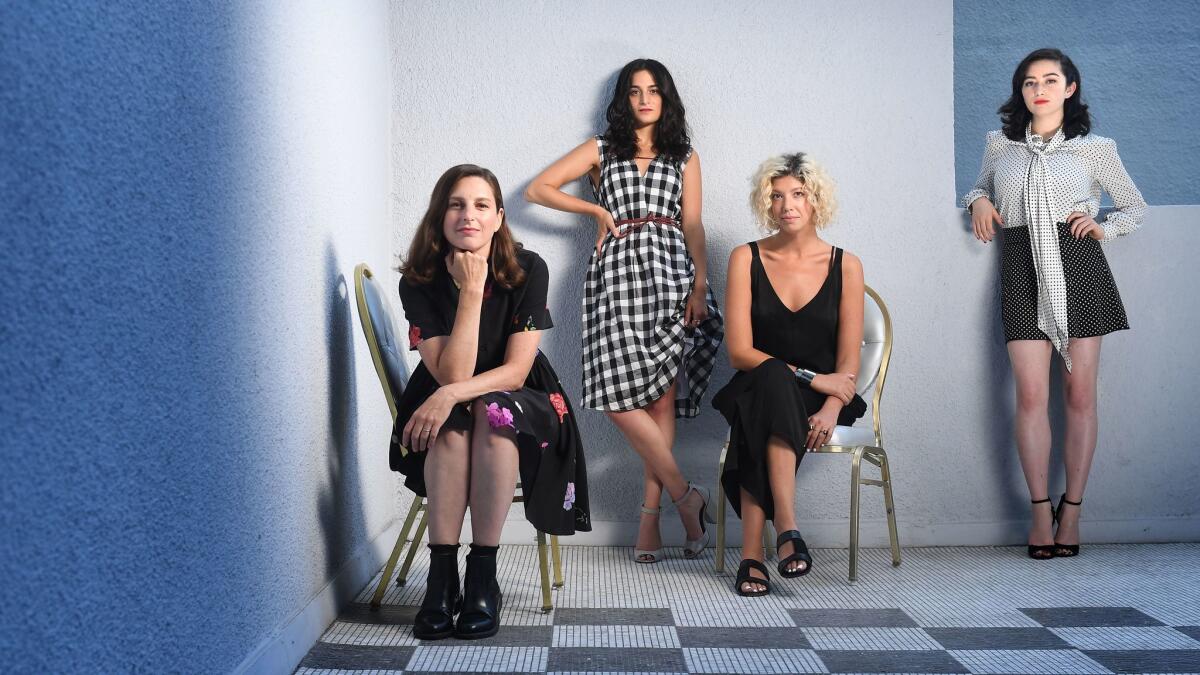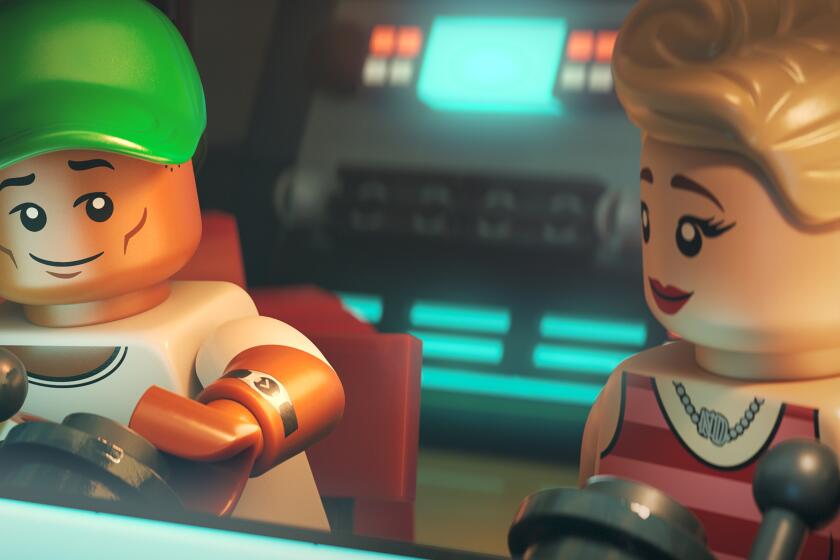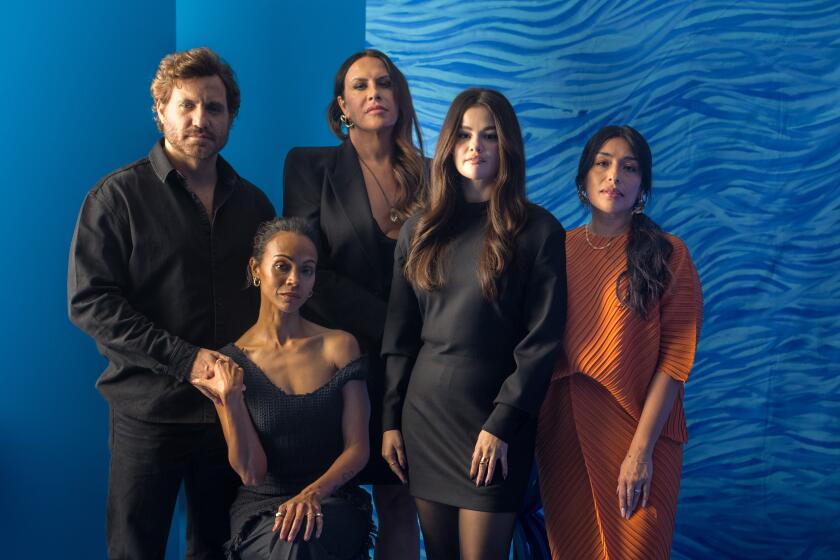On sisters and snacks with Jenny Slate and the team behind ‘Landline’

Remember back to a time, if you can, before widespread cellphones, before texting and email were preferred modes of communication. The new film “Landline” is set specifically in 1995 and brings back a world of pay phones, pockets full of change to pay for pay phones and the fact it once seemed much more likely to just not connect with someone.
The story centers on Dana (Jenny Slate), who seems to have her life on track with a nice fiancé (Jay Duplass), a nice apartment, a good, quiet job working in production at a hip magazine. Until it suddenly doesn’t feel right anymore and she flirts with rekindling an old flame (Finn Wittrock), gets an eyebrow pierced and crashes back at her family’s apartment. Which lands her squarely back in the drama of her squabbling parents (Edie Falco, John Turturro) and high-school age sister Ali (Abby Quinn). Soon the sisters are snooping after their father, whom they suspect of having an affair.
Yet the movie is more than just a knockabout period piece. It is also an exploration of family, emotional support and self-discovery — what might now be called self-care — and how something as potentially devastating as divorce can still present possibilities of renewal.
“It’s a romantic comedy sort of sans romance, but with love and intimacy and passion,” said director and co-screenwriter Gillian Robespierre.
“I feel like we can tell a story that has romance while still questioning these pillars of what so often define a romantic comedy — a woman meets a man or a woman has to choose between two men,” said producer and co-screenwriter Elisabeth Holm.
The movie marks the continued collaboration among Slate, Robespierre and Holm, who made the 2014 feature “Obvious Child.” That film was notable for dealing directly with abortion within the dynamics of an ostensible rom-com. As with “Obvious Child,” their new movie is wry and observational, sparked by Slate’s expressive, affecting performance.
When Robespierre, Holm and Slate sat along with new addition Quinn for a recent interview in Los Angeles, the warm affection and admiration among them was palpable. Nevertheless, in furthering their work together, Robespierre said they were also wary “to not do ‘Obvious Child 2.’”
“We wanted to expand, on how we’d weave different story lines together, different characters, how they’d react with each other within a scene,” said Robespierre. “I feel like ‘Landline’ is a little more dramatic even though it’s about a divorce, not an abortion. In many ways I feel like this one is darker than the first movie. And I like that, I like the darkness.”
Both films function more or less in the mode of the romantic comedy, though shot through with real life issues that complicate the story and the characters’ behaviors. For Slate, those complications aid in avoiding the pitfalls of what she often finds to be unrealistic depictions of women in Hollywood movies created to appease audience expectations.
“What I feel wary of is this character trope that I find is repeating itself around our industry that’s like, ‘There’s a woman and she doesn’t have it all together and she’s messy but it’s OK. Her mess isn’t going to freak you out, she’s not actually messy,’” Slate said. “’She’s whimsical, and out-of-control in a way that’s attractive, to you, men.’
“Donna in ‘Obvious Child,’ she thought she had it all together,” Slate added. “Dana in ‘Landline’ is making mistakes and making them on purpose in a pretty intense way.”
The seeds of “Landline” came from conversations Robespierre, Holm and Slate had while traveling to promote “Obvious Child” — late nights spent talking in hotel rooms. After the world premiere of “Landline” this year at the Sundance Film Festival, Holm described their writing process as “pajamas and wine.”
“We both live in Brooklyn, we usually meet at Gillian’s house because it’s a lot cleaner than mine,” said Holm.
“I have better snacks,” interjected Robespierre.
“It’s true,” picked up Holm. “We meet up, we talk character, we talk about story, we talk about what we would like to see happen, where we would like to see people go. We talk about our lives, our pasts, our parents, our boyfriends, now husbands, and kind of whip all that up in the cauldron.”
Said Robespierre: “In many ways, ‘Landline’ started off as a movie about a whole family, focusing on the three generations of the women in the family, but then when Liz and I started writing these two sisters, we were possibly writing a little bit about our dynamic together. And a little bit of that sister story in ‘Landline’ is us, but a lot of it is Jenny and Abby.”
[We] really try hard to make our characters feel relatable and lived in and realistic and honest. But likable isn’t the first thing on our list.
— Gillian Robespierre, director and co-writer of ‘Landline’
Just as “Obvious Child” announced Slate as an actress to watch, “Landline” does the same thing for Quinn. Originally from Michigan, the young actress was striving to make a go of it in Los Angeles when the “Landline” script came to her by chance not long after she had caught up with seeing “Obvious Child.”
Quinn, born the year after when the movie is set, thought the moment when she flew from Los Angeles to New York to audition would be the end of her part in the project. “I just thought I was going to go there and audition and then like a year later hear about it as some other chick,” Quinn said. “Because I loved the script so much and it felt so right I just figured there’s no way it’s going to happen.”
The on-screen chemistry between Quinn and Slate, at times affectionate, at times annoyed, but always deeply felt, was noticeable to Robespierre and Holm right away. Quinn recalled that on the first day of shooting, Slate came by to check on her in her trailer, as Quinn was struggling to hide how nervous she was. Secretly, Slate was nervous too and Quinn put her at ease.
“I’ve never played a part like this,” Slate said. “A woman who’s rather square and sort of uptight but who is sort of itching from the inside out and who has based her life on certainty and now the one feeling she has is uncertainty. The wildness, the brambles that come out of her, that is so interesting to me. And Abby just really met me there.”
As Robespierre and Holm worked on exploring the relationship portrayed by Slate and Quinn, balancing the sisters’ dynamic within the larger whole of the family, they often found themselves bumping up against notions of the frequently used term “likable.”
In “Landline” characters act impulsively and at times recklessly, and those were the exact things the filmmaking team did not want to lose, the challenging complexities and idiosyncratic contours that make the characters seem like people.
“Liz and I really try hard to make our characters feel relatable and lived in and realistic and honest,” Robespierre said. “But likable isn’t the first thing on our list.”
“And they will be likable if you connect with them. I think if they do feel real and grounded and true, you like them because you understand them,” said Holm. “To me that is what makes me excited about another human being, the sense that there’s some there there, and that the there is complicated. I think it is extremely important to us to show and share women who feel rooted and full.”
SIGN UP for the free Indie Focus movies newsletter »
Follow on Twitter: @IndieFocus
More to Read
Only good movies
Get the Indie Focus newsletter, Mark Olsen's weekly guide to the world of cinema.
You may occasionally receive promotional content from the Los Angeles Times.










